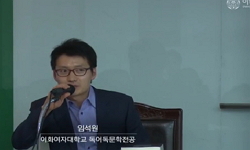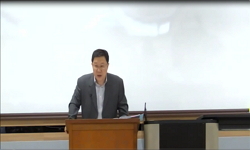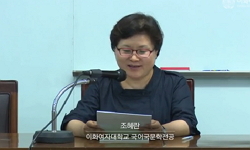Publishing of a scholastic lady`s collection of literary works is contradictory to the Confucian ideology which restricts women`s social activities. Women`s collections of literary works published in spite of this contradiction are the very spot where...
http://chineseinput.net/에서 pinyin(병음)방식으로 중국어를 변환할 수 있습니다.
변환된 중국어를 복사하여 사용하시면 됩니다.
- 中文 을 입력하시려면 zhongwen을 입력하시고 space를누르시면됩니다.
- 北京 을 입력하시려면 beijing을 입력하시고 space를 누르시면 됩니다.

여성시문집의 간행과 19세기 경화사족의 욕망 -『정일당유고』의 간행을 중심으로- = Publishing of a Lady`s collection & ruined nobles` desires in early 19th century
한글로보기https://www.riss.kr/link?id=A75500442
- 저자
- 발행기관
- 학술지명
- 권호사항
-
발행연도
2008
-
작성언어
-
-
주제어
강정일당 ; 『정일당유고』 ; 경화사족 ; 19세기 ; 출판문화 ; Jeongildang Gang ; 姜靜一堂 ; Jeongildang yugo ; 『靜一堂遺稿』 ; Seoul cultural area ; 19th century ; Publishing
-
KDC
800
-
등재정보
KCI등재
-
자료형태
학술저널
- 발행기관 URL
-
수록면
369-406(38쪽)
-
KCI 피인용횟수
23
- 제공처
- 소장기관
-
0
상세조회 -
0
다운로드
부가정보
다국어 초록 (Multilingual Abstract)
Publishing of a scholastic lady`s collection of literary works is contradictory to the Confucian ideology which restricts women`s social activities. Women`s collections of literary works published in spite of this contradiction are the very spot where various ideologies conflict with desires. This paper intended to survey the specific aspects of that conflict through the publishing process of `Jeongildang yugo`(『靜一堂遺稿』) published in early 19th century. Gwang-yeon Yun(尹光演), her husband, brings Jeongildang Gang(姜靜一堂) into a `female Sung Confucianist(女性性理學者)` and also brings his family into `literary family` through `Jeongildang yugo`. In addition, by adding the poems of men out of the family who remembered Jeongildang Gang as an appendix, he displays the social ties of his family. That is, Gwang-yeon Yun is using `Jeongildang yugo` to make sure of his family`s social position. Publishing collections of literary works was commonly used by ruined nobles in order to preserve their families in the late Joseon(朝鮮) Dynasty. `Jeongildang yugo` shows that that kind of thing was done even by women. While, Gwang-yeon Yun`s editing style is directly opposite to the virtue to `hide their names` that women from noble classes should have. Accordingly, Gwang-yeon Yun makes Jeongildang Gang a person who earned the social respect, and on the other hand, describes her as a person who thoroughly kept `women`s virtues`. Even the men out of the family mobilized in publishing `Jeongildang yugo` joined him in bringing Jeongildang Gang into a `female Confucianist` while recalling that the publishing is contrary to the `women`s virtues`. All of this is attributed to Seoul cultural area in early 19th century where Gwang-yeon Yun belonged. That is, the atmosphere that women`s talents were positively recognized and women`s literary activities extending to the outside of family were not restrained was created in Seoul cultural area in early 19th century. That atmosphere in Seoul cultural area was the background that Gwang-yeon Yun`s desire could be satisfied.
참고문헌 (Reference)
1 김영민, "형용모순을 넘어서-두 명의 조선시대 여성 성리학자-" 한국철학학회 83 : 7-33, 2005
2 홍한주, "지수념필" 아세아문화사 영인 347-348,
3 최연미, "조선시대 여성 편저자, 출판협력자, 독자의 역할에 관한 연구" 서지학회 23 : 113-147, 2002
4 강정일당, "정일당유고" 국학자료원 영인 4 : 1457-1612, 2003
5 서영수합, "영수합고" 국학자료원 영인 3 : 1225-1322, 2003
6 김경숙, "신위: 예술가의 감성으로 꽃피운 여성 인식" 집문당 377-404, 2003
7 고연희, "신위(申緯)의 회화관과 19세기 회화" 한양대학교 한국학연구소 37 : 163-191, 2003
8 김현, "성리학적 가치관의 확산과 여성" 고대 민족문화연구소 41 : 455-488, 2004
9 홍직필, "매산집" 민족문화추진회 영인 295 : 1-643,
10 신위, "경수당전고" 민족문화추진회 영인 291 : 1-626,
1 김영민, "형용모순을 넘어서-두 명의 조선시대 여성 성리학자-" 한국철학학회 83 : 7-33, 2005
2 홍한주, "지수념필" 아세아문화사 영인 347-348,
3 최연미, "조선시대 여성 편저자, 출판협력자, 독자의 역할에 관한 연구" 서지학회 23 : 113-147, 2002
4 강정일당, "정일당유고" 국학자료원 영인 4 : 1457-1612, 2003
5 서영수합, "영수합고" 국학자료원 영인 3 : 1225-1322, 2003
6 김경숙, "신위: 예술가의 감성으로 꽃피운 여성 인식" 집문당 377-404, 2003
7 고연희, "신위(申緯)의 회화관과 19세기 회화" 한양대학교 한국학연구소 37 : 163-191, 2003
8 김현, "성리학적 가치관의 확산과 여성" 고대 민족문화연구소 41 : 455-488, 2004
9 홍직필, "매산집" 민족문화추진회 영인 295 : 1-643,
10 신위, "경수당전고" 민족문화추진회 영인 291 : 1-626,
11 김남이, "강정일당의 ‘대부자작’에 대한 고찰 -조선 후기 사족 여성의 글쓰기와 학문적 토양에 관한 보고로서-" 한국고전여성문학회 11 (11): 51-90, 2005
12 이영춘, "강정일당-한 조선 여성 지식인의 삶과 학문" 가람기획 1-276, 2002
13 송치규, "강재집" 민족문화추진회 영인 271 : 1-341,
14 최수경, "明末淸初 女性의 語文活動을 둘러싼 몇 가지 쟁점 ―독서행위를 중심으로" 중국어문학연구회 40 (40): 455-484, 2006
15 박무영, "19세기 향촌사족의 여성 형상:‘金三宜堂’(Ⅰ)-향촌사족 연구와 三宜堂稿 살리기를 겸하여-" 한국고전문학회 25 (25): 217-253, 2004
16 이혜순, "19세기 전반 강정일당의 예론" 이화여대 출판부 251-280, 2007
동일학술지(권/호) 다른 논문
-
- 한국고전문학회
- 김승우 ( Seung U Kim )
- 2008
- KCI등재
-
- 한국고전문학회
- 서철원 ( Cheol Won Seo )
- 2008
- KCI등재
-
- 한국고전문학회
- 안대회 ( Dae Hoe Ahn )
- 2008
- KCI등재
-
주제 중원지역 전통문화의 문학지리학적 고찰 충청북도 마을신앙 현황과 당신화(堂神話) 전승 가능성
- 한국고전문학회
- 최명환 ( Myung Hwan Choi )
- 2008
- KCI등재
분석정보
인용정보 인용지수 설명보기
학술지 이력
| 연월일 | 이력구분 | 이력상세 | 등재구분 |
|---|---|---|---|
| 2027 | 평가예정 | 재인증평가 신청대상 (재인증) | |
| 2021-01-01 | 평가 | 등재학술지 유지 (재인증) |  |
| 2018-01-01 | 평가 | 등재학술지 유지 (등재유지) |  |
| 2017-11-15 | 학술지명변경 | 외국어명 : Journal of Classical Literature -> Journal of Korean Classical Literature |  |
| 2017-10-13 | 학회명변경 | 영문명 : 미등록 -> Korean Classical Literature Association |  |
| 2017-10-11 | 학술지명변경 | 외국어명 : 미등록 -> Journal of Classical Literature |  |
| 2015-01-01 | 평가 | 등재학술지 유지 (등재유지) |  |
| 2011-01-01 | 평가 | 등재학술지 유지 (등재유지) |  |
| 2009-01-01 | 평가 | 등재학술지 유지 (등재유지) |  |
| 2007-01-01 | 평가 | 등재학술지 유지 (등재유지) |  |
| 2004-01-01 | 평가 | 등재학술지 선정 (등재후보2차) |  |
| 2003-01-01 | 평가 | 등재후보 1차 PASS (등재후보1차) |  |
| 2002-01-01 | 평가 | 등재후보학술지 유지 (등재후보1차) |  |
| 1999-07-01 | 평가 | 등재후보학술지 선정 (신규평가) |  |
학술지 인용정보
| 기준연도 | WOS-KCI 통합IF(2년) | KCIF(2년) | KCIF(3년) |
|---|---|---|---|
| 2016 | 0.93 | 0.93 | 0.99 |
| KCIF(4년) | KCIF(5년) | 중심성지수(3년) | 즉시성지수 |
| 0.88 | 0.93 | 2.124 | 0.2 |




 KISS
KISS







